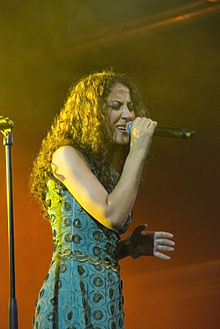Aynur Dogan
Aynur Doğan (born March 1, 1975 in Çemişgezek ) is a Kurdish singer from Turkey.
Life
youth
Doğan was in the province of Tunceli in eastern Anatolia born. She completed her school education in Tunceli, later in Elazığ . In the early 1990s she moved with her family to Istanbul , where she graduated from high school.
Career
She says she only got to know music in Istanbul - “in the village where you grow up with sheep and lambs” there was none. On the advice of friends, she ultimately embarked on an artistic career. Doğan took lessons at the Arif Sağ Music School for Bağlama (" Saz ") and sheet music reading in Istanbul. She later studied singing with Begüm Erdem and Aşkın Metiner at the ASM.
In 2002 her first album Seyir came out, she took part in concerts and worked on albums by artists and groups such as Metin-Kemal Kahraman, Grup Yorum , Lütfü Gültekin, Anjelika Akbar and Orient Expressions; She also gave her voice to television and cinema. She sang in Kurdish and Turkish during performances at home and abroad.
With the collaboration of musicians such as Aykut Gürel, Serdar Ateşer, Kemal Sahir Gürel and Burhan Bayar, her album Keçe Kurdan (“Kurdish Girl”), a combination of Turkish and Kurdish folk songs and new compositions , was released in 2004 .
Quickly reaching the top of Kurdish music albums, Keçe Kurdan has received a lot of attention in the Turkish and international press. The English magazine "Folk Roots" put the album on its cover. Aynur's picture appeared on the cover of a March 21, 2005 insert in London Time Magazine entitled "The Cultural Wealth of Turkey".
15 months after the album Keçe Kurdan was released, the 6th criminal chamber of Diyarbakır decided to ban the album because the song of the same name encourages women to go to the mountains and become involved in (Kurdish) separatism. However, the judgment was overturned in September 2005.
Through Yavuz Turgul's film Gönül Yarası from 2005 Doğan became the first artist to sing live Kurdish (“Dar Hejiroke”) in a Turkish film. She can also be seen in Fatih Akıns documentary film Istanbul Hatırası (“Crossing the Bridge”) from the same year. Also that year she contributes songs to Kardeş Türküler's album Bahar and Mikail Aslan's album Miraz (both Kalan Müzik). In the same year her album Nupel was released . The auteur filmmaker Yüksel Yavuz uses her song Keçe Kurdan in his 2007 documentary Close up Kurdistan .
In September 2009, Aynur Doğan was a guest with İbrahim Tatlıses in the musical entertainment series Ibo Show . There she sang Kurdish songs with the titles Ahmedo ("Mein Ahmet") and Daw (Turkish ayran , "buttermilk") in a live broadcast . Two years later, she left Turkey after being yelled at by nationalists at the Istanbul International Jazz Festival and pelted with seat boxes. She currently (beginning of 2018) lives in Amsterdam.
In July 2014 , the FAZ wrote a half-page article in the features section about the reception of Aynur Doğan in Germany in 2014 and its history .
Discography
- Ateş Yanmayınca
- 2002 Seyir
- 2004 Keçe Kurdan (Turkish Kürt Kizi "Kurdish girl")
- 2005 Nûpel (Turkish Yeni Sayfa , "new page")
- 2010 Rewend
- 2013 Hevra (Together) (German: "Together")
- 2016 Hawniyaz
Web links
- Official website
- Susanne Schanda: Aynur's pure voice. Norient, January 25, 2009
Individual evidence
- ↑ Archived copy ( Memento from February 21, 2018 in the Internet Archive )
- ↑ Here is Turkey, kindly sings in Turkish in FAZ from July 8, 2014, page ^ 14
| personal data | |
|---|---|
| SURNAME | Dogan, Aynur |
| BRIEF DESCRIPTION | Turkish singer |
| DATE OF BIRTH | March 1, 1975 |
| PLACE OF BIRTH | Çemişgezek |

